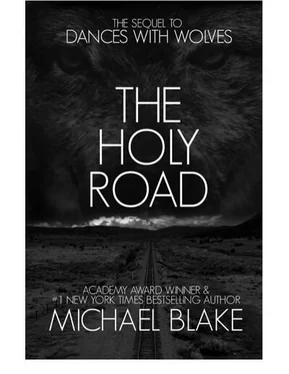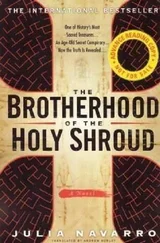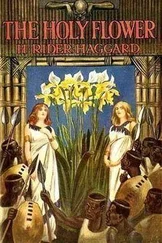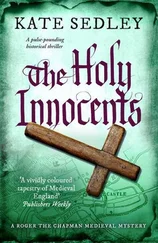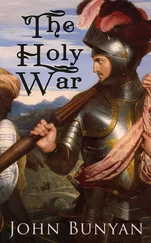Michael Blake - The Holy Road
Здесь есть возможность читать онлайн «Michael Blake - The Holy Road» весь текст электронной книги совершенно бесплатно (целиком полную версию без сокращений). В некоторых случаях можно слушать аудио, скачать через торрент в формате fb2 и присутствует краткое содержание. Год выпуска: 2011, Жанр: prose_military, на английском языке. Описание произведения, (предисловие) а так же отзывы посетителей доступны на портале библиотеки ЛибКат.
- Название:The Holy Road
- Автор:
- Жанр:
- Год:2011
- ISBN:нет данных
- Рейтинг книги:3 / 5. Голосов: 1
-
Избранное:Добавить в избранное
- Отзывы:
-
Ваша оценка:
- 60
- 1
- 2
- 3
- 4
- 5
The Holy Road: краткое содержание, описание и аннотация
Предлагаем к чтению аннотацию, описание, краткое содержание или предисловие (зависит от того, что написал сам автор книги «The Holy Road»). Если вы не нашли необходимую информацию о книге — напишите в комментариях, мы постараемся отыскать её.
The Holy Road — читать онлайн бесплатно полную книгу (весь текст) целиком
Ниже представлен текст книги, разбитый по страницам. Система сохранения места последней прочитанной страницы, позволяет с удобством читать онлайн бесплатно книгу «The Holy Road», без необходимости каждый раз заново искать на чём Вы остановились. Поставьте закладку, и сможете в любой момент перейти на страницу, на которой закончили чтение.
Интервал:
Закладка:
Having no idea what the ritual might mean, Kicking Bird's curiosity gave way to astonishment as the white man's mouth suddenly admitted the stick and a violent scouring commenced inside.
The best Kicking Bird could deduce was that, though it lacked any hint of elegance or sanctity, Lawrie Tatum must be performing some kind of purification ceremony. Perhaps there was some evil entity residing in his mouth.
After repeating the action several more times, the stick was withdrawn and shaken. Lawrie Tatum lifted the canteen to his lips, sloshed the water around in his mouth, and, bending forward, spat all of it onto the ground. Then he turned as casually as if he had just urinated and disappeared into the lodge.
Any chance Kicking Bird might have had for sleep was doomed by what he had witnessed. Seeing such inexplicable conduct reinforced and sharpened all that was different between Indian and white, and as he continued to sit in the shadow of the moon, contemplating Lawrie Tatum's bizarre behavior he felt the cloud of euphoria he had been riding all afternoon slowly dissipate.
Exchanges of information and negotiation that might determine how the two peoples could coexist were nothing when compared to the gulf in ways of being that existed between the races, and it was with that mindful realization that Kicking Bird finally went back to his bed.
What little rest he at last achieved was more akin to intermittent catnapping than it was to real sleep: His hopes had sobered but not died, and he floated through a queer twilight of consciousness in which he reminded himself that even if it would be prudent to go slower the prospect of more interplay with Lawrie Tatum the following day was an exciting one.
It never occurred to him that he would not see Lawrie Tatum the following day. Nor did it occur to him that one of the men who had gone hunting with Dances With Wolves would be standing at his lodge door in the predawn chill.
The weary voice calling for him to come out belonged to Lone Young Man, and when the Comanche statesman looked into his face he knew something terrible had happened.
The lodges of the Kicking Bird delegation had been struck, their horses gathered and loaded, and the entire party had already ridden clear of Touch The Clouds' camp when Lawrie Tatum stepped timidly out of his guest quarters half an hour after sunup.
At first he was disoriented, because he was certain that the man called Kicking Bird had been living in a spot that was now bare. As soon as he saw Touch The Clouds, the Quaker agent tried to clear up the confusion, and after a few minutes of fitful signs and words and playacting, the suspicion was confirmed. The Comanche Lawrie Tatum thought of as intelligent and levelheaded had simply picked up and left, presumably for home, without saying good-bye and without any agreement to meet again.
It wasn't as if Lawrie Tatum hadn't been warned. Anyone who had ever dealt with Indians had told him they could not be trusted — that understanding the Indian mind was about as easy as figuring out the meaning of life, that depending on an Indian to do what he said he would do was like a dry farmer depending on rain in a drought.
Lawrie Tatum remembered these admonitions when he glanced again at the vacant ground lately occupied by Kicking Bird's lodge. He still liked the Comanche and it was not in his constitution to give up — whether it be on a patch of skimpy corn back home or the ambitious peace policy the government was hoping he and scores of other Quakers would find a way to implement.
And yet there was bristling in a remote corner of his mind. As he stared at the ring where Kicking Bird's lodge had lately been, Lawrie Tatum couldn't help feeling that in some way he had been played for a fool.
Chapter XIX
It was a typical cavalry unit: heavy with men who had not served long, a few savvy veterans with the tenacity to forge a career in the army and a commander who only needed to shave every third or fourth day.
At the beginning, reports of a Comanche war party had roused the troops with the prospect of relief from the drudgery of work detail and the incessant nitpicking of certain officers who treated the dreary garrison as their personal fiefdom. All but the most chronic goldbricks had jostled for a place in the unit that was formed to take the field, and despite the lack of fanfare that signaled their departure for the wilderness, spirits were high when they rode out.
It was not long, however, before a host of deficiencies began to glare in the bright light of action. Their fuzz-faced commander little more than an earnest boy from a decent family, was operating under a purposely vague directive: to drive the marauders away from the property of citizens without actively engaging them unless fired upon. The lack of potency in his orders immediately created hesitancy and doubt in the young lieutenant, which soon spread virus-like to each member of his command.
To make matters worse, an individual who was far better suited to the role of confidence man than scout had been delegated by the post commander to guide the lieutenant across country, break trail, and advise him on matters pertaining to modes of Comanche warfare.
The scout looked the part. He wore buckskin pants, a flannel shirt, a plumed campaign hat, moccasins, and a band of silver rings on his wrist. But in truth, most of his getup, like the arsenal of weapons he carried, was plunder from his past career as one of numerous ex-Confederate soldiers who had mined opportunities for mischief and crime up and down the Texas frontier in the years following the War Between the States.
None of this came out when he offered his services to the post commander, speaking in a slow, deliberate drawl. At strategic intervals in his fabricated personal history he directed a stream of tobacco juice into a nearby spittoon with uncanny accuracy, a feat which in the eyes of the post commander lent credibility to all he said. The presence of two scruffy Tonkawas standing silently against the back wall also seemed to underline the scout's veracity, and although he demanded an unusually high fee for his services, the post commander was unwilling to let such a valuable man slip away for want of a few dollars.
The scout had counted on the naivete of the military and, upon meeting the young lieutenant he was to serve, felt his confidence soar. Neither he nor his Tonkawa assistants had ever been in Comanche country, but the lieutenant had never been anywhere, having only lately arrived in Texas. Duping the post commander had been easy enough and pulling the wool over the shavetail's trusting eyes was about as hard as robbing a church.
Still, the scout's charade might have been exposed. A veteran sergeant had suspected fraud from the outset and he mentioned his misgivings to the lieutenant. But the young officer didn't act on the sergeant's hunch because the scout and his Tonkawas, once they picked up the trail, had been tracking the big Comanche war party with pronounced ease.
The success of the so-called scouts was not due to their expertise, however. It was wholly attributable to Wind In His Hair's clever, timeless strategy of luring the enemy to his doom. The column of horse soldiers had been watched from the moment they took the field, and on several occasions when the hair-mouths hesitated in their trek, warriors were dispatched to show themselves in order to keep the pursuers on course.
The line of march was designed by Wind In His Hair to take the white men through the roughest country possible in hope that they would break down. At the end of the first day, the soldiers found themselves at a stream whose water was so alkaline that horses refused to drink and the troops, even after straining it repeatedly, swallowed the muddy liquid only with great difficulty.
Читать дальшеИнтервал:
Закладка:
Похожие книги на «The Holy Road»
Представляем Вашему вниманию похожие книги на «The Holy Road» списком для выбора. Мы отобрали схожую по названию и смыслу литературу в надежде предоставить читателям больше вариантов отыскать новые, интересные, ещё непрочитанные произведения.
Обсуждение, отзывы о книге «The Holy Road» и просто собственные мнения читателей. Оставьте ваши комментарии, напишите, что Вы думаете о произведении, его смысле или главных героях. Укажите что конкретно понравилось, а что нет, и почему Вы так считаете.
